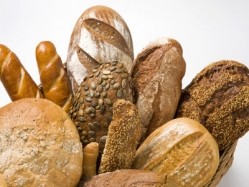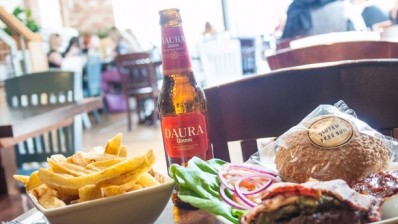Into the mainstream: are restaurants catering for gluten-free growth?

The latest data from Mintel reveals that the UK free-from market grew by 10% year-on-year to £347m in 2013, and is due to reach £519m by 2016. Gluten-free products account for nearly half (45 per cent) of total retail free-from sales.
The market is now so big that Europe has its own dedicated Free-From Expo, where businesses can source new suppliers and learn about the latest trends in the fast-moving industry. This year's event will take place in Brussels, Belgium on 3-4 June.
Hamish Renton, of Renton Associates- a founding partner of the European Free From Expo, told BigHospitality the rapid growth of the free-from market at retail reflects the huge demand for gluten- and dairy- free products amongst consumers.
He explained that while only around 5 per cent of the population are coeliac and have a severe gluten allergy, a further 10 per cent of the population are gluten intolerant and suffer unpleasant effects when eating gluten, and another 5 per cent avoid gluten for lifestyle reasons.
“The people eating in restaurants are the same people that are buying gluten-free products in supermarkets,” he said.
He added that while some people who have mild intolerances to gluten might have put their demands backburner while eating out, he expects to see growing demand for gluten-free menus in the future.
Independent lead
Interestingly, Renton said it is independent restaurants and contract caterers that have been driving the growth in gluten-free, with the big high street chains only just starting to include gluten-free options, and most still very limited in what they offer.
A quick BigHospitality Twitter survey confirmed that there are loads of independent operators and small groups making a concerted effort to include gluten-free options on their menus.
Amico Bio, Vinoteca and Honest Burgers were amongst the London venues to say they take pride in producing a few gluten-free options every day, while The Grove in Cromer and Loves Restaurant in Birmingham said they are flying the flag for gluten-free outside the capital.
"It's something we always bear in mind, allergies and intolerances," said Willoughby Andrews, general manager at Vinoteca Soho. "We always make sure we have at least a nut-free dessert, a dairy-free main and the same goes for gluten.
"It's just important for us to be able to offer the choice, and we make sure the staff understand the menu and can reassure the customer."
Lough Erne Resort in Co. Fermanagh also got in touch to say it is now offering gluten-free afternoon tea.
Noel McMeel, executive head chef at Lough Erne Resort said: “My first rule of hospitality is to put guests at their ease. When serving meals, one of the most generous things a host can do is to make sure each and every person has something delicious to eat that suits both taste and dietary needs. I like to offer alternatives when someone can’t eat like the rest of the crowd.”
Other restaurants, such as Vietnamese restaurant Pho and polenta-based La Polentaria, claim they are now serving exclusively gluten-free food.
Make your own
So what are the challenges of going gluten-free?
Tom Thexton, chef/owner of London-based gluten-free bakery Wild Thexton, which supplies restaurants and hotels, said he has seen a ‘large increase’ in demand for gluten free bread recently, suggesting that finding the right quality produce is one of the biggest hurdles.
Mark Poynton, owner/patron of Michelin-starred restaurant Alimentum, told BigHospitality he overcame this problem by making his own gluten free bread.
“We started making our own gluten free bread as the ones we could buy we're not as good as the quality as the normal bread we make which really annoyed me,” he explained.
“The hardest thing to get was Psyllum Husk powder which helps to give the dough its structure in the same way gluten does.”
Ingredients
Poynton said that when planning a gluten free menu, it is important to think about the balance of a dish. If gluten is essential to the dish then it is best to think of something else, but if the gluten element can be replaced by another ingredient without losing too much taste it is worth making the change.
“Also be sure to check your ingredients,” he stressed. “Simple things that people add to stuff contain gluten, like most soy sauce.”
Amy Palmer, of SureFoot health and safety consultants, agreed that it is vital to fully understand exactly what ingredients contain gluten and what don't. She said it was also important for restaurants to avoid cross-contamination in the kitchen when cooking gluten-free dishes.
Forewarning
Another issue raised was the ability to plan ahead, with chefs and restaurateurs agreeing that they have a better chance of catering for specific allergies, intolerances and dietary choices if they are forewarned by the customer.
Accuracy
Mallams Restaurant in Weymouth said that it was also important that all staff understood the importance of being accurate when explaining ingredients to customers.
John Cook, head chef at Vinoteca Farringdon, agreed. "It's important for us to know what's not gluten-free so we can communicate to the customer," he explained. "Our signature bavette & chips might seem gluten-free but there's oyster sauce in the marinade which contains wheat."
And, finally, it was pointed out that restaurants must also be accurate when labelling menus because under EU law, anything described as 'gluten-free' must be contain less than 20 parts per million of gluten.
For more on catering to allergies and intolerance, including a summary of the incoming EU legislation on allergens, check out our special feature on dietary requirements.






















